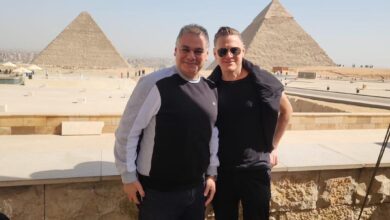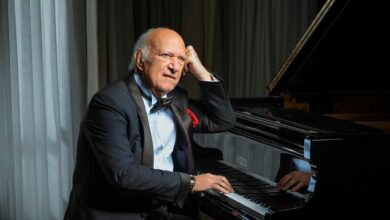
Most times that Palestinian artist and musician Reem Kelani was in Tahrir Square, she took her tape recorder along. She weaves some of these recordings into her radio piece “Songs for Tahrir.”
The focus is on song and music, and alongside the new musical sounds of a young generation — music such as the collective compositions of the Choir Project and Ramy Essam's music drawn from people's slogans — she hears the sounds of old pioneers: Sayyed Darwish, Sheikh Imam and Abdel Halim Hafez, among others. She was particularly excited to find the music of Darwish, a man whose music she has been researching for the past eight years, at the heart of mass protests in 2011. She describes Darwish as a “composer, revolutionary, man of the people.”
The narrative that Kelani creates is both unobtrusive and essential. She gives a sense of the revolution as ongoing, a sense of music as integral to protest. She captures the creativity, spontaneity and potency of protest not just during the 18 days in January, 2011 that led to former President Mubarak’s fall, but also in November when the security and military forces attacked protesters in Tahrir Square.
Songs old and new, powerful chants and slogans and ambulance sirens against the backdrop of chants of “freedom, freedom” come together to create a full and rich soundscape of resistance. And as Salam Yousry of the Choir Project says, some of the best music of the revolution came from people who we don't even know. The Choir Project's work involves collective composition, incorporating the perspectives and experiences of many. In a stirring clip from their concert just days after Mubarak's fall, we hear, “Might, strong will and faith, Egypt's revolution is everywhere.”
But, even bands that have been performing for years, found their songs gaining new meaning when performed at the square. The Eskendrella band composes its own music, as well as playing songs from old greats such as Darwish, Sheikh Imam and poems by Saleh Jaheen and Fouad Haddad. They are activists, and throughout 2011 have performed at protest after protest. Band member Samia Jaheen says that when the band performed “Remember Egypt is still beautiful” – written by Haddad and composed by Hazem Shahin – before the revolution, they were accused of chauvinism. Many responded by saying, “We Egyptians have so many problems…We are dirty, rude, poor, and uncivilized.” But, Jaheen argues, “We need to unite to believe in ourselves, and that's how we will become better. We will not become the best we can be by insulting each other.”
Kelani does not promise an objective or comprehensive account of the music of the revolution — which would, of course, be impossible. Rather, she delivers a sensitive, subjective and insightful exploration of music and protest in today's Egypt, an optimistic one that observes the present and is informed by the history of subversive music in Egypt. Having participated in the initial 18-day uprising, she returned in November — coincidentally on the day that five days of street fights between protesters and security forces began — and interviewed several of the activists, poets and musicians she had met in Tahrir Square earlier in the year. She unabashedly focuses on Darwish, a man whose music the regime either ignored or exploited and whose songs found a rightful home on the streets of Egypt in 2011.
Darwish lived and worked in working-class neighborhoods. The sounds and intonations he heard around him, Kelani explains, went into his songs, many of which were written for the oppressed and marginalized. And in this way, his music was both from and for the people. Kelani takes her tape recorder with her away from Tahrir Square, and records the kinds of sounds that Darwish would have heard and incorporated into his music. From the sound of market-sellers calling out their produce to the ubiquitous and nasal tones of “bikya, bikya” of those who buy and sell on the street, Kelani offers a soundscape of Cairo that complements and informs the soundscape of revolution.
She tells us about one of Darwish's songs — on the surface about dates, but actually in praise of the nationalist anti-colonial leader Saad Zaghloul. She sings the opening lines, and in a beautiful moment, the date seller she is talking to takes up the song. The music of Darwish was rooted in the struggle against colonialism, and Khaled Abol Naga, the lead actor in “Microphone,” a film about the alternative music and art scene in Alexandria, says that if we compare the attitude the regime held toward the people with that of colonial powers, you can see why his lyrics resonate again.
The music of Darwish that was sung in Tahrir Square encompassed political and love songs, and also a song of love for the homeland, the Egyptian national anthem, “Biladi, biladi” (Oh, my Country), the words of which come from a speech by anti-colonial leader Mostafa Kamel — a speech that inspired the teenage Darwish to write it. After signing peace with Israel, the regime did not want to continue using a national anthem glorifying military struggle, and so it went back to the iconic anthem of 1919. In this way, a regime subservient to Western interests neutralized the anti-establishment and anti-colonial ethos of Darwish and the national anthem itself. Sung by thousands and millions in 2011 facing the security forces of that same regime, the song's potency was renewed and reinvigorated.
Kelani’s work stands out for putting art and music into a context that includes all kinds of resistance and political discussion. It collapses artificial distinctions between art and politics, as she describes the way singing sustained protest. Interweaving the sounds of Cairo's streets with chants and song, she gives music a privileged place not apart from the ordinary, but emerging from and returning to the daily sounds that make up our lives. While recognizing the novelty and creativity of much of the music, she simultaneously ties it to music from the past that also emerged from a collective rage. And as one slogan chanted on the country's streets proclaims, “The rage of Egyptians is a dangerous thing” — for those in power, of course.
The original version of this article, published on 26 January, stated that “Remember Egypt is still beautiful,” was composed by Sayyed Darwish. The article has been edited to reflect that the song is written by Fouad Haddad and composed by Hazem Shahin.




